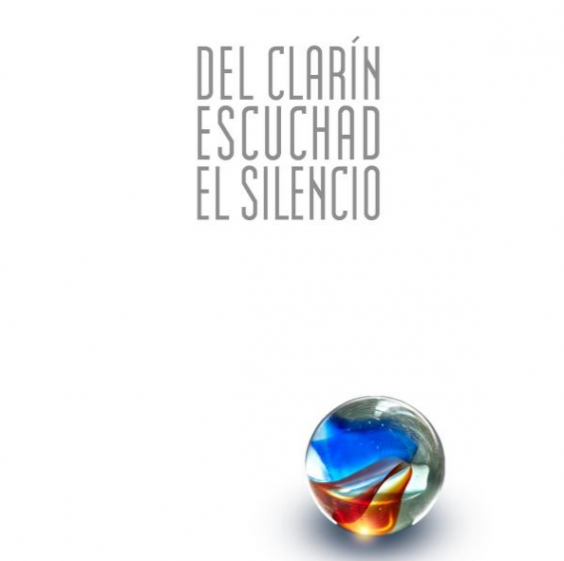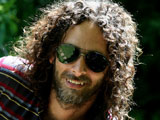We Spoke in Fear of Speaking
by Orlando Luis Pardo Lazo translated by Alex Higson / July 29, 2016 / No comments

Del clarín escuchad el silencio. Image via: Amazon.com.
Orlando Luis Pardo Lazo’s latest book, Del Clarín Escuchad el Silencio (Listen to the Bugle’s Silence), is available from Hypermedia Ediciones.
We spoke in fear of politics. It was the winter of 1989, and we had recently started university. None of us were even twenty years old, and we were already corpses of the period’s collectivized diet of the glory of Cuban communism. We wanted to survive to the end of history. But outside the red world was ending, even though in Cuba the only thing that was falling was red rain, as the poet José Kozer described it. The newspaper headlines were full of gloom. “He Who Lives by the Sword, Dies by the Sword,” just one example. Pieces of the Berlin Wall were beginning to fall, from Beijing to Panama. One of those bricks went into orbit and brought down Sputnik (the Soviet press’s selection of selections in Spanish, which circulated à la Perestroika in Havana, causing alarm among the proletariat caste who held power). Fidel got serious. Haggard, shaken. I seem to recall that he went gray in just a few weeks: a Marie Antoinette marionette. He lost his teeth and got implants. The Gorbachev–Ochoa axis cast a shadow over our fidelanthropic ogre. Lacking Eastern European “fuel,” Fidel executed the heretic heroes of his totalitropicalism. Perhaps Fidel was the only Cuban aware back then that we would still have to survive another 30 years of dragging along the anticapitalist chains of his Revolution. At the time, we were making Homeric love—many for the first time, with slow clumsiness. Meanwhile, Fidel was digging tunnels—what they were for, or with whom he would use them, only he knew. Every holocastro begins with a silent h.

- Is it worth-while to focus on the last images and letters coming from the inside of the last living utopia on Earth? Is Cuba by now a contemporary country or just another old-fashioned delusion in the middle of Nowhere-America? A Cold-War Northtalgia maybe? Can we expect a young Rewwwolution.cu within that Ancien Régime still known as The Revolution? I would like to provoke more questions than answers.

- Orlando Luis Pardo Lazo was born in Havana City and still resides and resists there, working as a free-lance writer, photographer and blogger. He is the author of Boring Home (2009) and is the editor of the independent opinion and literary e-zine Voces.
We spoke in fear of politics. It was the summer of 1994, and we had recently finished university. Fidel seemed a lot more animated, rejuvenated. He had made a deal with the devil, or something like that. But everyone else was looking weak and had pallid skin. We were a people with polyneuritis and polyneurosis. Sex for sale and tranquilizers in the national currency. In Havana there were horrific attacks and serial killings like some kind of Hollywood Z movie. Rumors were gathering pressure. Suicides were the order of the day, some provoked by the Ministry of the Interior. Almost no one was taken prisoner, but the prisons were still packed: a materialist miracle of a behind-bars rhetoric. The currency of our enemy to the death was little by little healing an economy wounded by the State: Fidel personally authorized an unpleasant — and unlawful — dollarization. Drowned bodies were floating in the Island’s torrid-territorial waters: their organs eaten by fish, sometimes cut up by other boat people, run aground here and there on the reef. This was the city as a whole: an arid, unforgiving desert. I saw Cubans running like riled-up horses through the streets of Centro Habana. “Pinga!” they shouted. “It’s fallen!” they shouted. “Hunger!” they shouted. “Freedom!” they shouted. And then, they threw themselves like lemmings into the sea. (This is a biological myth: The sea itself is a myth in Cuba.) An intranational exile took place at the Yankee naval base at Guantánamo. Tens of thousands of Cubans fled from Cuba towards Cuba, desperate to be taken prisoner by the U.S. Navy. Others lost their legs in the fields of land mines with which Cuba claimed to be protecting itself from the United States (but in reality, this wall of mines is simply to keep our population at home). At the time, we were making almost epic career plans—we were swimming in the solvent time of the Center for Genetic Engineering and Biotechnology (CIGB), affiliated to the Council of State — while Fidel was signing migration agreements at full force with Clinton, who in turn signed the Helms–Burton Act to provide Castroism with the long-awaited isolation within which it could incubate its bubble of impunity.
We spoke in fear of politics. It was the winter of 1998, and the Polish Pope syllabicated and slobbered in Havana. He smiled with the a priori peace of saints. He raised his voice up beyond the carillon of his vocal chords. He was seen as a little old man somewhere between wisdom and skepticism, barely standing by the force of his divine will. He was a true post-communist, who knew that intercontinental Castroism would be as eternal as Rome itself. (Castroism embodies that love that capital cannot give us; Castroism is a great paternalistic remedy against all our uncivil infant deficiencies; Castroism is the worldly trinity: Fidel, State, Revolution.) I thought that the Pope would collapse from happiness in the middle of the Plaza de la Revolución: “You are a very enthusiastic people,” he lied (we are apathy made a people). But among the mob we again heard the shouts of “Freedom! Freedom!” And the provocative words of Father Pedro Meurice at the Santiago de Cuba mass still resounded in our ears (it was shocking to hear them through the antiquated microphones of the national TV network). My girlfriend sat on my shoulders for a while. She was heavy. It was far sunnier than it should have been at that time of year. The steel Che Guevara and the paper Christ melted iconoclastically. Fidel was wearing a suit, and perhaps a tie, I’m not sure. It gave me a premonitory fall, a little prodemocracy faint, but I resisted till the end (just like how García Márquez and his cancer spread online when in Cuba we still didn’t have the internet). When the Pope’s plane took off, I understood literally what our secular solitude meant, how alone we were as a people before the eternal titan that was Fidel. I saw the impossible sense of emptiness in the soul that we Cubans would carry in life without our beloved first dictator. (To use the title of “dictator” for any of the Island’s previous dictators would be an affront to those of us who have grown accustomed to our constitutional Castroism.)
We spoke in fear of politics. It was the summer of 2001, and Fidel was dying for the first time (but no one now remembers this death). It was a “fall,” in the improvised words of the foreign minister, Pérez Roque, live on TV. A few hours after his official fainting fit, the commander had been spectacularly resuscitated for a ghostly round-table meeting. Our man in the Plaza made jokes about his death; he was jovial. Fidel said on camera that his fall had been a kind of rehearsal for his wake. For the first time in decades, the TV commentators spoke against him. They said it was not true, that he could never die. And Fidel judged them according to the level of public abjectness that they demonstrated. We no longer loved anyone too much, but Fidel’s tunnels were still there (a gruyère Havana): swollen tracheotomies lit with a thrifty Made in Beijing lightbulb. Those incredible breeding grounds of edible mushrooms and fallout shelters have ultimately been turned into a niche for strictly underground Cuban copulation. To top it off, I had by then been kicked out of the CIGB for being “unsuitable” and having secret plans to emigrate (and also for having written a counterrevolutionary poem on the Pope’s homily in the Plaza in contrast with Fidel’s hysterical speeches there). I found a part-time job as a cultural promoter. I saw myself as an amateur comic who feigns happiness, introducing artists’ groups and book launches and literary workshops for morons. I felt very sad and very free. I stopped reading. My best friend died of emphysema at a party. I sensed that the next one of my group of friends to die would be me. I still didn’t even want to leave Cuba. I wanted to show the world that my generation’s greatest failure — me — would be our collective vengeance against Fidel’s collectivism (co-lective: Cuba is a caged classroom where we all read the same thing to the point of nausea).
We spoke with fear of politics. It was the Black Spring of 2003, and I was an apocryphal in-the-pendant journalist. I earned clandestine royalties, in a literary field where living off the text can be punished as a criminal act. Of course, I also fell into the plotline of publishing short stories and poems in Cuba, a country that at times seems like a publishing paradise and at others is a pedagogical prison (Mission Makarenko). Sometimes I had the luxury in the same week of alternating heteronyms between the Castroist La Jiribilla magazine and the anti-Castroist Cubanet (in the worst modus scribendi of a démodé Pessoa between the Cuban Ministry of Culture and the Miami Miracle Mile). I suspect I was the most independent man of my generation: a Cubanietzschean Kakfa self-termed “der unabhängigste Mann in Amerika.” Months or years later, Fidel fell head first and, with his left arm still in plaster, took the dollars out of circulation. I cried from pure numismatic nostalgia: Cuba’s pesos have such a repressive design that they make you not even want to get rich. More than that, I had grown accustomed to the double-currency iconography of our Das Kubapital. I bought a Canon camera and concentrated wholesale on photographing Cuban flags: flagtography. But on the third day I was imprisoned for photographing a ruined chimney stack with a snub-nosed Martí right in the foreground. (I was freed by a neighbor, a police captain who knew the dominoes of corruption from the inside.) Nobody I cared about had stayed in Cuba. I had to look for love in the two or three generations younger than me (today they are all younger), and it was only then that I understood that Castroism is a risky billiards game where no one ever finds love.
By then we spoke not in fear nor of politics. It was fall of 2015, and Fidel was the nonagenarian shadow of a promotional Adidas track suit fetish, typing his reflections for a twenty-first century that never was (Fidel twentieth-centurified our lives in a single blow with his charisma, or perhaps his fin-de-siècle balls). Through a Raulist crack, a couple of years earlier I had left Cuba with the promise of not seeing again the only city in which my heart can be believed (I also promised not to publish any work in Cuba until January 1, 2059, when the Revolution will be but a laughable memory). “Havana, open up and swallow me,” wrote the servile slave Virgilio Piñera before opening himself up and swallowing the city (quod scripsi, scripsi). I grew silent, I grew angry, I grew old. I forgot, I hated, I forgot. Off of the Island I found out that Exile comes before all notion of nation, that the homeland is a geographical misunderstanding, that Fidel is ephemeral in perpetuity, and that the Revolution exists because so do the most expensive universities in North America (the Fidelivy League), where my testimony was received like a circus curiosity: “Look, he’s Cuban and he’s a critic. Do you see, academic colleagues? Things in Cuba are changing!”




